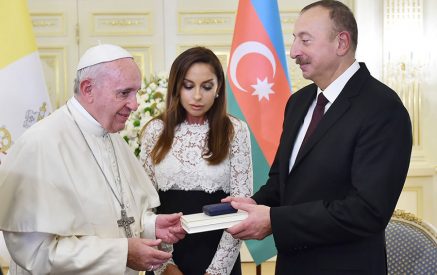By Suzanne Antelme
The Oxford Nizami Ganjavi Centre (ONGC) is funded by an anonymous £10 million donation and has on its board the sister-in-law of President Aliyev, Azerbaijan’s autocratic ruler. The makeup of the centre’s board and the University’s refusal to identify the donor have drawn criticism from academics concerned about the preservation of academic freedom.
This comes amidst the ongoing imprisonment of Dr Gubad Ibadoghlu, an LSE academic and government critic arrested in Azerbaijan this summer on charges condemned as false and politically motivated.
Read also
Neither the University nor the centre have reacted to Dr Gubad’s predicament. His family are calling for this silence to be broken.
The centre
According to its website, the Oxford Nizami Ganjavi Centre was established in 2019 to study the “history, languages and cultures of Azerbaijan, the Caucasus and Central Asia”. The centre offers visiting fellowships and funding for graduate students, and supports Azerbaijani language instruction at Oxford. It is funded by an anonymous £10 million endowment “given in recognition of the British Foundation for the Study of Azerbaijan and the Caucasus [BFSAC] in 2018”.
On the centre’s board sits Nargiz Pashayeva, the sister-in-law of President Ilham Aliyev, the autocratic ruler of Azerbaijan. Her sister, Mehriban Aliyeva, is Azerbaijan’s First Lady and first ever ‘Vice President’, the second highest constitutional office in the country to which her husband appointed her immediately after creating it in 2017.
Freedom House characterises Azerbaijan as an authoritarian regime, with power “heavily concentrated in the hands of Ilham Aliyev … and his extended family. Corruption is rampant, and the formal political opposition has been weakened by years of persecution.”
Dr Tena Prelec, Assistant Professor at the University of Rijeka and a former Research Fellow at Oxford’s Department of Politics and International Relations, told Cherwell: “[Pashayeva’s] connections with the Azerbaijani ruling elite could not be stronger. It has been proven that hundreds of millions of pounds linked to the Azerbaijani elite have been laundered through UK real estate (the Azerbaijani Laundromat); while attempts by Azerbaijan to influence political decisions through bribery have also been established beyond doubt (the so-called ‘caviar diplomacy’ scandal at the Council of Europe). For those reasons alone, Pashayeva’s involvement in an Oxford research centre warrants particular care and attention.”
In addition to being on the ONGC’s board, Nargiz Pashayeva played a key role in setting up the centre. She is credited with establishing collaboration with the University back in 2014 in the form of the ‘Nizami Ganjavi Programme’, a five-year research programme worth £1 million with similar research aims. She also “facilitated” the creation of the ONGC itself in her role as chair of the British Foundation for the Study of Azerbaijan and the Caucasus (BFSAC).
Given its focus on cultural studies, the centre appears non-political. However, in a letter to the Foreign Secretary in 2020 urging the UK to take a more pro-Azerbaijan approach regarding conflict between Azerbaijan and Armenia, Lord Malcolm Bruce described the ONGC as an “important symbol of inclusiveness promoted by Azerbaijan today”. Lord Bruce is a member of the UK House of Lords and was also the British co-founder of BFSAC, the charity chaired by Pashayeva and recognized by the ONGC’s mystery £10 million donor. BFSAC closed down in October 2022.
Lord Bruce told Cherwell he “supported the establishment of the [ONGC] as a non-political, academic and cultural centre for promoting interest in the Caucasus and central Asian region”, noting that “the donation enabling the foundation of the centre was subject to and approved through Oxford University due diligence”.
Regarding the contents of his 2020 letter, he pointed to UN criticism of Armenia’s actions at the time and emphasised that his “only interest was and remains in securing a long-term settlement and improvement in Azerbaijan-Armenia relations”, adding that he has “been critical of the regime in Azerbaijan and the lack of free and fair elections”.
Lord Bruce was formerly the Council of Europe’s Rapporteur for Political Prisoners from 2003-2005, and is noted in ESI’s ‘Caviar Diplomacy’ report as having taken a relatively critical stance towards the Azerbaijani regime.
The funding
When asked about the identity of the anonymous donor, Oxford University told Cherwell: “The University will not disclose the name of the donor; the terms of the gift are such that the donor wanted to be anonymous, and the University is respecting that agreement.























































